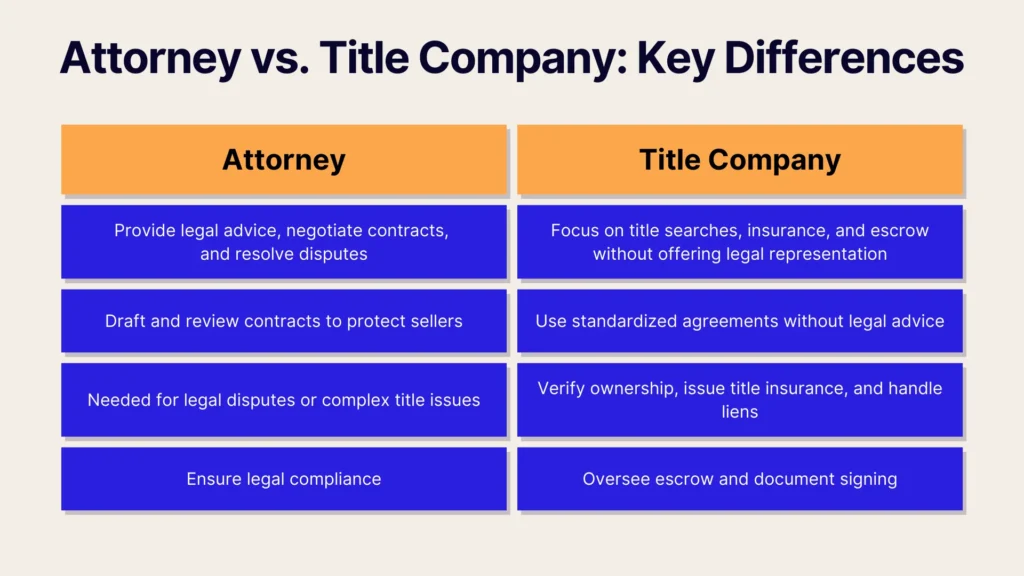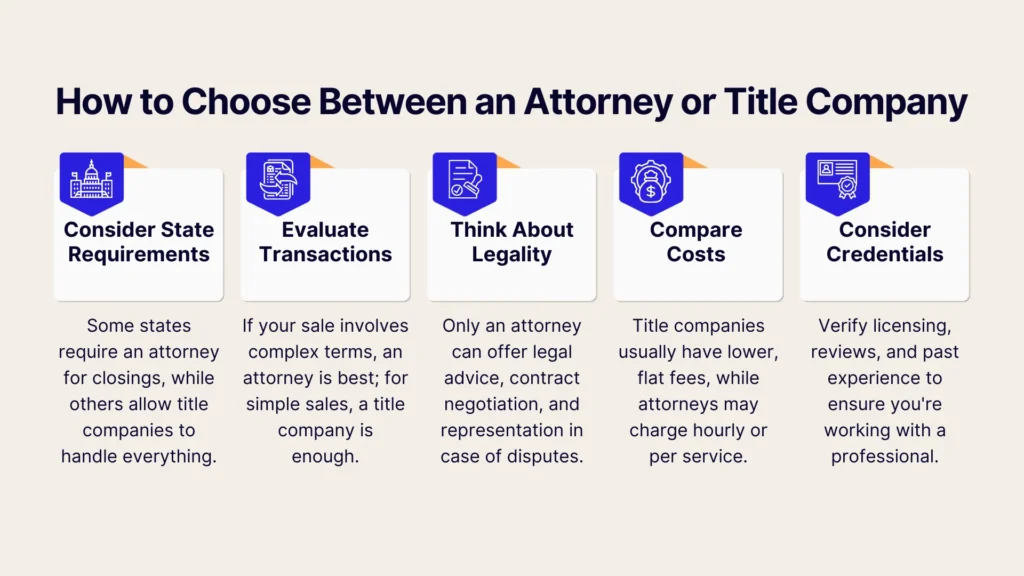Selling your home FSBO can be an exciting way to save on commission fees, but it also means taking on responsibilities that a real estate agent would typically handle. One of the most significant decisions you'll face? Who will guide you through the legal and closing process—an attorney or a title company?
Understanding the roles of each can make the difference between a smooth and stressful sale. With the proper professional guidance, such as that provided by attorneys and title companies, you can navigate the FSBO process with confidence and optimism.
In this article, we’ll break down the key differences between attorneys and title companies, their roles in an FSBO transaction, and how to decide which professional is the right fit for your sale. Let’s dive in!
Understanding the Key Players in a Real Estate Transaction
When selling a home FSBO, you won’t have a real estate agent guiding the process, but you still need professionals to help ensure a legal, smooth transaction. Two key players in this process are real estate attorneys and title companies. While their roles sometimes overlap, they serve distinct purposes in protecting the buyer and seller.
What Does a Real Estate Attorney Do?
A real estate attorney protects your legal interests throughout the sale. Their role may include:
- Drafting and reviewing contracts ensures that the purchase agreement is legally sound, fair, and protects your rights.
- Addressing legal issues: If title disputes, easements, or liens arise, an attorney can help resolve them.
- Negotiating terms: If the buyer requests contract changes, an attorney can negotiate on your behalf.
- Ensuring compliance: Different states and provinces have unique real estate laws, and attorneys provide you meet all legal requirements.
- Overseeing closing: In some states, an attorney must be present at closing to finalize the transaction.
Hiring an attorney is particularly useful for complex sales involving inherited properties, seller financing, or unique contract terms.
What Does a Title Company Do?
A title company plays a crucial role in verifying property ownership and ensuring a secure closing process. Their responsibilities include:
- Title search: They examine public records to ensure no outstanding liens, unpaid taxes, or ownership disputes.
- Title insurance: They issue policies that protect the buyer and lender from future claims against the property’s title.
- Escrow services: They often act as a neutral third party, holding funds and documents until all conditions of the sale are met.
- Facilitating closing: Many title companies handle closing, ensuring all documents are signed and funds are appropriately distributed.
In FSBO transactions, many sellers work with a title company for their expertise in handling paperwork, managing funds securely, and ensuring a clear title transfer.

Attorney vs. Title Company: Key Differences
When selling a home FSBO, you need professionals to guide you through the legal and financial complexities of the transaction. Real estate attorneys and title companies play crucial roles but offer different services.
Attorneys focus on legal protection and contract review, while title companies handle title verification, escrow, and closing logistics. Understanding these differences can help FSBO sellers make an informed choice about who to work with.
Legal Expertise vs. Transactional Services
The most considerable distinction between a real estate attorney and a title company is their level of legal expertise.
Real estate attorneys are licensed professionals who can provide legal advice, negotiate contracts, and represent you in disputes. They are essential if your sale involves complex legal issues, such as property liens, boundary disputes, or seller financing.
Title companies are not law firms. They focus on the transactional side of a home sale—ensuring a clear title, issuing title insurance, and managing escrow. They cannot provide legal representation or advice.
An attorney is the right choice if you need legal protection. If your transaction is straightforward, a title company may be sufficient.
Handling Contracts and Legal Issues
Contracts are legally binding agreements, so it is critical to ensure they are properly drafted and reviewed.
Attorneys draft, review, and modify contracts to protect your interests. If the buyer requests changes, an attorney can negotiate terms on your behalf. They also ensure your contract complies with local real estate laws.
Title companies typically use standardized contracts and do not offer legal advice. While they may facilitate the signing of documents, they do not review or modify contracts for legal soundness.
An attorney is better if you need customized contract terms or legal guidance.
Title Searches and Title Insurance
A title search ensures that the sold property has no outstanding claims, liens, or ownership disputes. Title companies conduct title searches and issue title insurance to protect the buyer (and lender) from future claims.
Attorneys can also perform title searches and help resolve legal complications, such as disputed ownership or title defects. While title companies specialize in this process, an attorney may be necessary if title issues require legal action.
Managing the Closing Process
The closing process is where all funds, documents, and legal requirements come together to complete the sale. Title companies often manage the closing by holding escrow funds, preparing closing documents, and ensuring all paperwork is signed correctly and recorded.
Attorneys can also oversee closing, ensuring that legal documents are correctly executed and all terms of the sale are legally sound. In some states, an attorney must be present at closing. Even if not required, having legal guidance can help ensure a smooth, legally secure transaction.
Which One Do You Need as an FSBO Seller?
As an FSBO seller, choosing between a real estate attorney and a title company depends on the complexity of your transaction and your need for legal protection. If your sale is straightforward, a title company may be enough. However, if there are legal complications, an attorney is essential. Using both can provide full coverage for a smooth transaction in some cases.

When an Attorney Is Essential
There are several situations where hiring a real estate attorney is necessary rather than optional:
- You need legal advice or representation: Only an attorney can offer legal guidance on contract terms, seller obligations, or potential legal risks.
- There are legal disputes: If there is a disagreement over property ownership, boundary lines, or contract terms, an attorney can resolve conflicts and protect your rights.
- Your property has liens or title defects: If your home has an unpaid mortgage, tax liens, or ownership issues, an attorney can help clear the title before closing.
- You're selling an inherited property: If multiple heirs are involved, an attorney can handle probate issues, estate settlements, and legal transfers.
- You're handling a complex sale: Situations like seller financing, lease-to-own agreements, or commercial property sales require legal guidance to structure agreements properly.
Example: If you’re selling a property you inherited with a sibling, but they are disputing the sale, an attorney can mediate the conflict and ensure a legal resolution.
When a Title Company Is Sufficient
A title company can manage the transaction efficiently and at a lower cost for standard home sales. Their key services include:
- Title search and title insurance: Ensures the property has a clear title and protects the buyer from future ownership claims.
- Escrow and closing services: Holds funds and ensures all documents are completed correctly before transferring ownership.
- Flat-fee pricing: Title companies typically charge set fees for services, unlike attorneys who bill hourly for legal work.
Example: If you’re selling a home with no title issues and a buyer has secured a mortgage, a title company can handle the closing and issue title insurance without needing an attorney.
When You Might Need Both
Sometimes, working with an attorney and a title company provides the most security. This is common when:
- You want legal advice but also need title services: An attorney can draft and review your contract while the title company handles the title search, escrow, and closing.
- The sale requires coordination between legal and transactional services: If you’re selling a property with a title issue that requires legal resolution, you’ll need both professionals.
- State law requires an attorney at closing: Some states mandate that an attorney oversees the closing process.
Example: If you’re selling a home with a clouded title due to a past ownership dispute, a title company will find the issue, but an attorney must clear the title before closing.
State-Specific Requirements: Do You Have a Choice?
You must check your state's legal requirements before deciding between an attorney or a title company. Some states mandate that an attorney be involved in real estate transactions, while others allow title companies to handle everything.
Attorney States vs. Title Company States
- Attorney-required states: A licensed real estate attorney must oversee the closing process in New York, Georgia, and South Carolina. If you’re selling FSBO in these states, you will need an attorney at some stage.
- Title company-friendly states: In states like Texas, California, and Florida, title companies can handle closings, title insurance, and escrow services without an attorney.
- Hybrid states: Some states allow either an attorney or a title company but require legal documents to be prepared or reviewed by an attorney (e.g., North Carolina and Massachusetts).
If you’re unsure about your state’s laws, check with your local real estate board or a professional before deciding.

How to Choose the Right Professional for Your FSBO Sale
The right choice depends on your transaction’s complexity, budget, and legal needs. Here’s how to evaluate your options.
Assessing Your Transaction’s Complexity
Ask yourself: Is my sale straightforward, or does it involve legal risks?
A title company may be sufficient if:
- The property has a clear title (no liens, unpaid taxes, or ownership disputes).
- The sale follows standard procedures (buyer financing through a bank, no special contract terms).
- You want a cost-effective closing process without attorney fees.
An attorney is recommended if:
- The property has title complications, such as unresolved liens or multiple owners.
- You’re dealing with or selling an inherited property as part of a divorce settlement.
- The sale involves seller financing, lease-to-own agreements, or non-traditional terms.
If your transaction has legal risks, hiring an attorney upfront can prevent costly problems later.
Getting Quotes and Comparing Costs
Before hiring an attorney or title company, compare fees and services. Here’s how:
- Request fee estimates: Ask for a breakdown of costs, including title searches, contract reviews, escrow services, and closing fees.
- Ask about additional costs: Some attorneys charge a flat rate for FSBO closings, while others bill hourly for legal services.
- Find out who handles what: Confirm whether you’ll need an attorney for contract drafting or dispute resolution if hiring a title company.
Example Questions to Ask:
- What’s included in your closing fee?
- Do you charge separately for contract reviews or legal advice?
- How long does the closing process typically take?
- Have you worked with FSBO sellers before?
Checking Experience and Credentials
When hiring an attorney or title company, experience matters. Here’s how to vet professionals:
For attorneys:
- Ensure they are licensed in your state and specialize in real estate law.
- Check reviews or ask for references from past FSBO sellers.
- Confirm they have experience handling contract negotiations, title disputes, and closings.
For title companies:
- Look for certifications from organizations like the American Land Title Association (ALTA).
- Check their track record for title searches and closings.
- Verify they offer escrow and title insurance services for added protection.
You can confidently choose the proper professional to protect your sale and ensure a smooth transaction by researching.
Key Considerations to Make
Choosing between a real estate attorney and a title company for your FSBO sale isn’t a one-size-fits-all decision. Your choice should consider factors like the nature of the sale, legal requirements, and budget. Here’s what to consider before making your decision.
Nature of the Real Estate Transaction
The first step in deciding who to work with is understanding the type of sale you’re dealing with. Some FSBO sales are straightforward, while others involve legal complexities that require an attorney’s expertise.
- Standard transactions: A title company may be enough if you sell a single-family home to a buyer with conventional financing.
- Unique or complex transactions: If your sale involves a foreclosure, short sale, inherited property, or seller financing, an attorney can ensure legal protection.
Simplicity vs. Complexity
How simple or complex is your transaction? If everything is clear-cut, a title company can handle the search, escrow, and closing. However, certain complications make an attorney necessary.
- Simple sale: No outstanding liens, clean title, and buyer financing in place → Title company is sufficient
- Complex sale: Legal disputes, multiple owners, or issues with the contract → Attorney is recommended
For example, if you're selling a property with a clouded title due to an old lien, a title company will identify the issue, but an attorney must resolve it.
Specific Legal Needs
If your FSBO sale involves legal risks, an attorney provides peace of mind and protection. Some common legal concerns include:
- Disputed property boundaries
- Zoning or land use restrictions
- Easements affecting property rights
A title company cannot provide legal guidance, so if you anticipate legal concerns, it is wise to hire an attorney.

Contractual Issues
Real estate contracts are legally binding, so mistakes can be costly. If you’re unsure about contract terms, an attorney can help with:
- Drafting a custom purchase agreement
- Negotiating terms if the buyer requests changes
- Ensuring the contract complies with state and local laws
Budget Constraints
Cost is a significant factor when choosing between a title company and an attorney.
- Title companies typically charge a flat fee, making them a budget-friendly option for standard sales.
- Attorneys charge hourly rates or flat fees, which can be more expensive but necessary for legally complex transactions.
If your sale is straightforward, working with a title company can save you money. However, hiring an attorney may prevent costly disputes if legal risks are present.
Value for Services
Beyond cost, consider what you’re getting for your money. A title company ensures a clear title, handles escrow and manages closing paperwork. An attorney provides legal protection, contract review, and problem resolution. Using both gives you full coverage—legal expertise plus title services.
Conclusion
Selling a home FSBO means taking on responsibilities that typically fall to real estate agents. Choosing between a real estate attorney and a title company depends on the complexity of your transaction, legal risks, and budget. A title company is often sufficient for standard sales, while an attorney is essential for legal disputes, contract negotiations, or title issues. In some cases, using both ensures complete protection.
Looking for a seamless FSBO experience? PropBox connects sellers with trusted real estate attorneys and title companies, making your transaction secure and hassle-free. Get started today!
